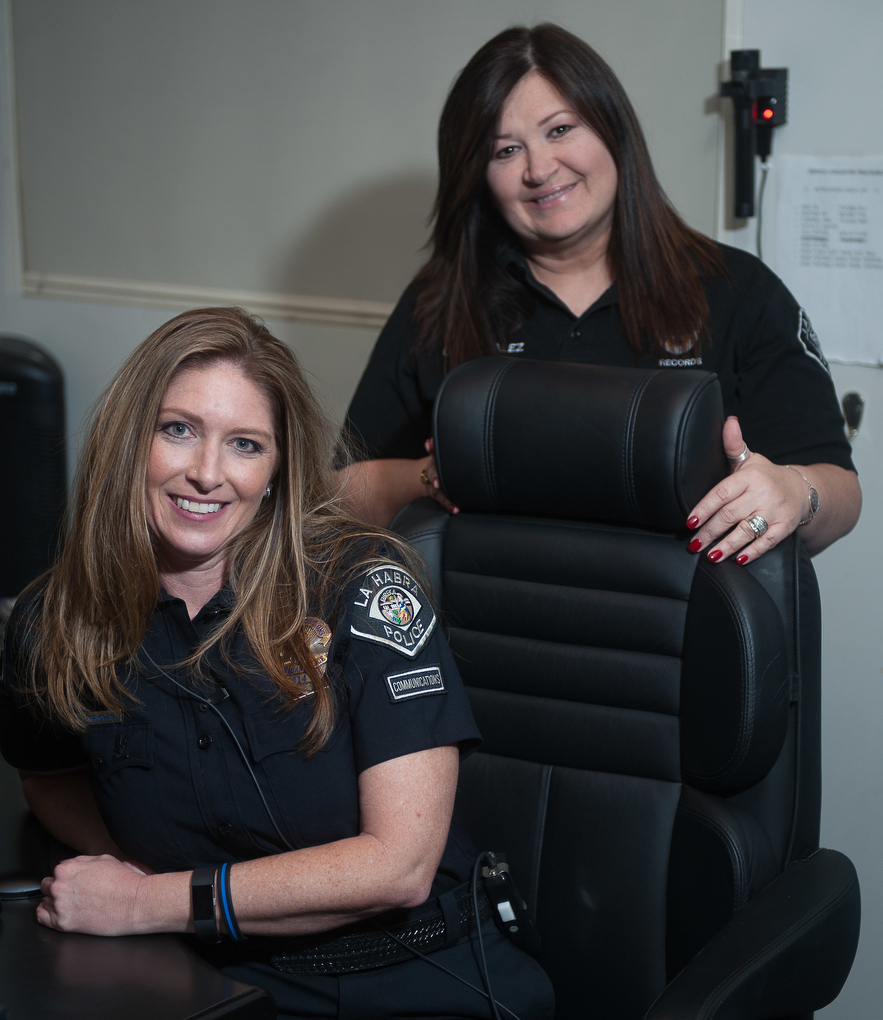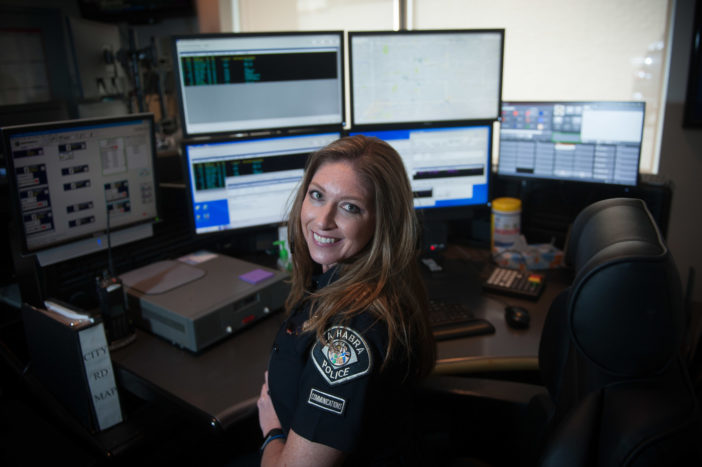The La Habra Police Department dispatchers sit behind a wall of monitors, constantly scanning each of six screens as they listen intently to the phone, radio, and officers who stop by with case updates.
They’re constantly multitasking, handling all calls to the police department, police radio calls, 911 calls, tracking officer locations, and monitoring the jail.
They have carefully trained their “dispatch ear” to listen to everything simultaneously.
“They’re pretty much rock stars in my book,” said Lead Records Specialist Cathy Gonzalez. “It takes a very disciplined, very motivated, very thick-skinned person to be a dispatcher.”

La Habra Police Department Lead Communication Operator Kristen Kernohan communicates with officers in the field from the headquarters’ dispatch center. Miguel Vasconcellos/Behind the Badge OC
It’s a tough job. Dispatch talks to callers in the worst moments of people’s lives. They endure anger and frustration, hectic shifts, and the knowledge that lives are on the line. And through it all, they must be professional, helpful, and calm.
Dispatchers at the La Habra Police Department train for 6 months minimum, in addition to a 3-week Peace Officer Standards and Training course at a local college.
“It’s way harder than what I thought it would be,” said Alexis Cornejo, who’s training to be a dispatcher at La Habra Police Department. “You’re always doing something. Even when it’s slow you’ll have something… You deal with different personalities and traits, and some people are nice and some people are mean. That’s definitely the hardest part.”
Cornejo studied forensics and criminal justice at Cal State Long Beach and was looking for a job in law enforcement when dispatcher Jennifer Romo-Andrade invited her to the La Habra Police Department to learn more.
“I never thought about dispatching, and I sat in here and saw it was a pretty interesting job,” Cornejo said.
Dispatch fulfills a life-long dream for lead dispatcher and acting supervisor Kristen Kernohan, who is following in the footsteps of her aunt, Kathy Moan, a Wyoming Highway Patrol dispatcher.
“I was 12 years old,” said Kernohan, who’s now been with the La Habra Police Department for 21 years. “I just remember being in her dispatch center and watching her… from that point on I wanted to be in law enforcement.”

La Habra Police Department Lead Communication Operator Kristen Kernohan, front, with Lead Records Specialist and part time Dispatcher Cathy Gonzalez in the dispatch center. Miguel Vasconcellos/Behind the Badge OC
The eight La Habra dispatchers work three 12-hour shifts, with an additional 8-hour shift every other week. To keep their hands free for typing, they wear headsets and step on a foot pedal to answer calls. In addition to their phone, radio, and monitoring duties, they also handle tasks like false alarm billing, alarm renewals, trespassing notices, and making copies of calls for service/radio transmission for court purposes.
“It’s different every day,” Kernohan said. “You never know what you’re going to come in to. And it’s always challenging.”
Kernohan particularly loves helping officers find missing people.
“I like to piece it together and try to figure it out,” she said. “A lot of us have that drive to find someone. If you committed a crime, we’re going to find out who you are. One of my favorite things is doing the research.”
In one case, a resident called 911 after seeing a man enter the back door of their home. Kernohan knew officers were searching for a man who fled a crime scene on foot, and made the connection. She kept the resident calm on the phone and instructed them to exit through an upstairs window while the suspect was downstairs and officers surrounded the house.
“Long story short, we had to have a K9 go in and the man was apprehended,” Kernohan said. “It’s not just the work we did in here, but the officers and the complete teamwork. I walked out of there that day going, ‘that’s why I do this.’”
The desire to help people is a common thread in the La Habra Police Department Communications Center, and is the reason Gonzalez changed careers to become a dispatcher after 25 years as a casino audit supervisor, though she now works in dispatch part-time and spends most of her hours in the records department.
“It’s a good feeling at the end of the day to know you helped out so many people,” Cornejo said.
 Behind the Badge
Behind the Badge



